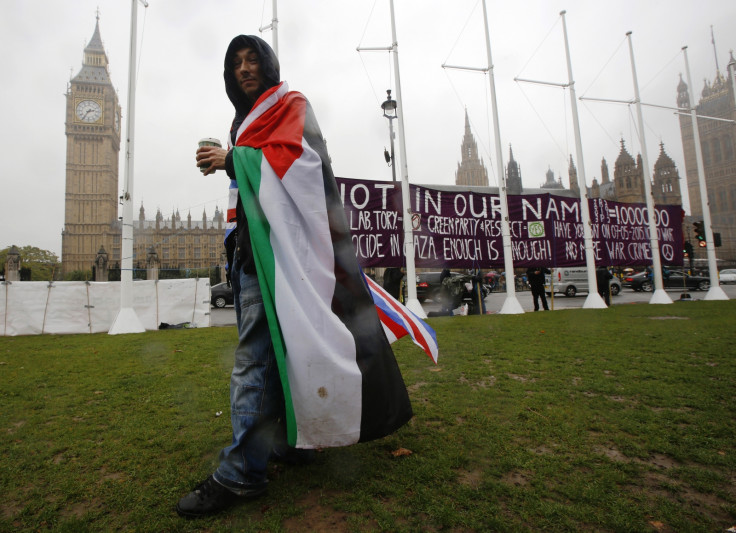MPs' Palestine Vote: Historic, Noble and Utterly Pointless

The mother of all parliaments has today decided to recognise the state of Palestine. Historic, noble, just and utterly pointless. MPs will return to their constituency casework and domestic concerns, preening themselves after a solid afternoon of making history. Some might even toast the victory in one of the estate's many drinking establishments. But today's vote will be nothing more than a footnote in the history of a conflict that is more bitter and more complex than most MPs will ever understand.
In the markets of Ramallah and Hebron, Palestinians will scoff at the news that the country of Balfour and General Wauchope had recognised their statehood. They will ask, "where is this state?" And what is our answer? Is it the state the Palestinians want, or the state we deem to give them? Is it the state that includes Hebron, or do we tear away from the Israelis one of the holiest sites in Judaism?
We are in no position here in Britain to offer any of these answers. We are powerless to give Palestinians any country of any shape or size. Israeli families in Sderot and Askhelon will be only a little bemused that the politicians of a country supposedly allied closely with their own has once again shown a trivial understanding of the conflict. Tonight, the Palestinians are still under occupation. The Israelis are no closer to withdrawing from the West Bank.
The vote changes nothing. The UN General Assembly voted to recognise the state of Palestine in 2011. It prompted an evening of celebrations in the West Bank. Fireworks, dancing and singing erupted. Yet in the morning, the grim checkpoint at Qalandria was still manned. Young Israeli conscripts began their shifts, wishing, like any other day, that they were anywhere but there, checking car after car.
We are powerless to give Palestinians any country of any shape or size.
The Palestinians thought the world had voted to bring them dignity and recognition. Instead the vote brought them false hope and a continuation of the status quo. It only angered the Israelis, who took that anger out on the Palestinian Authority and made the possibility of a long-term peace deal more remote, not closer. Tax revenues frozen, essential security cooperation repealed, border controls tightened. Threats, accusations of duplicity, mistrust and anger. Amid the self-congratulation of UN ambassadors, Palestinians had to suffer the consequences of the vote on the ground.
Israel-haters rejoice
British MPs, especially those who loathe the Israeli government, will delight in their self-declared message of solidarity for the Palestinians. They will unite in proclaiming that it is a "right to be recognised". And that Israel and Palestine should negotiate as equal partners. All very worthy sentiments. And wholly counterproductive. For any country to bilaterally recognise a Palestinian state without the acquiescence of Israel has no understanding of the nature of the conflict. A conflict that has been failed time after time by foreign political intervention. So nobody should be surprised that the conflict should be whipped up again by a short-term, artificial solution imposed by a foreign country thousands of miles away.
The vote does not even change the UK government's position. Yesterday, the UK was pushing for a viable Palestinian state based on the pre-1967 borders existing next to a secure Israeli state recognised by its neighbours. As of now, that remains our position. The vote is non-binding. British ministers, including David Cameron, abstained. The Labour leader, Ed Miliband, forced his MPs, including his frontbench, to vote for the motion. Some argue that this is a game-changer. That if Miliband becomes Prime Minister in 2015, the UK will formally recognise Palestine as a state.
But they are wrong. The UK will never formally recognise Palestine without the support of Israel. And nor should we. It is a conflict of two peoples. Both parties deserve our patience and our support. To antagonise Israel, one of our closest strategic allies in the region, is a detriment to peace. The Palestinians have a right to their country. But it will be a country that neighbours Israel. Which will trade with Israel, which will share security responsibilities with Israel, which will share resources with Israel.
To attempt to cut Israel out of the process that will create Palestine is a mistake – a trap Ed Miliband is walking into. Political short-termism has blinded him. If he makes it through the door of Number 10, he will need a combination of respect and credit from the Israelis to push for the sort of concessions necessary to forge peace. By pushing Labour MPs to carry today's motion, he has lost both, and it will be the Palestinians who will suffer tomorrow.
Ross Cypher-Burley is a former spokesman for the British ambassador to Israel, and now works for strategic communications firm Portland. You can follow him on Twitter here.
© Copyright IBTimes 2025. All rights reserved.






















